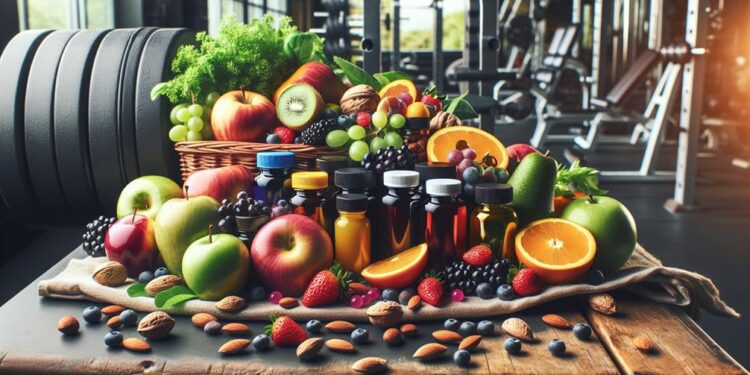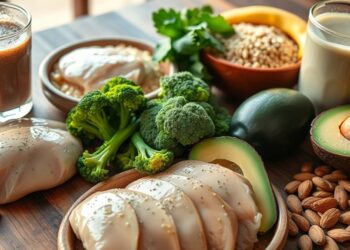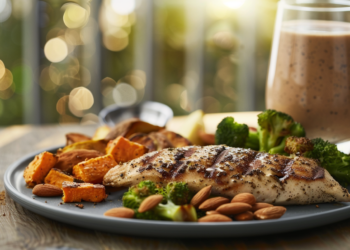It is understood that the right vitamins can boost our bodybuilding nutrition plans. Vitamin D is vital for muscle growth and strength. Vitamin C helps with recovery by reducing soreness and supporting healing. B vitamins are essential for energy production, helping us power through workouts. Vitamin E combats oxidative stress, protecting our muscles during intense training. Finally, vitamin A supports our immune system, ensuring we stay healthy and focused. By prioritizing these vitamins, we can enhance our overall performance and recovery. There’s a lot more to explore about optimizing our nutrition for better gains.
Key Takeaways
- Vitamin D: Essential for calcium absorption, muscle function, and strength; sources include fatty fish and sunlight exposure.
- Vitamin C: Reduces muscle soreness and aids recovery post-workout; recommended dosage for bodybuilders is 500 to 1000 mg daily.
- B Vitamins: Vital for energy production and metabolism; sources include whole grains, meat, and fortified cereals to prevent fatigue.
- Vitamin E: Protects muscle cells from oxidative stress and enhances recovery; found in nuts, seeds, and green leafy vegetables.
- Vitamin A: Supports immune function and vision, crucial for performance; sources include carrots, sweet potatoes, and spinach.
Vitamin D for Muscle Growth

Understanding the role of vitamin D in muscle growth reveals its significant impact on our strength and performance as bodybuilders. Research shows that vitamin D not only supports calcium absorption but also plays a key role in muscle function and development. When we maintain adequate levels of this vitamin, we enhance our muscle strength, potentially boosting our overall performance.
We can find vitamin D sources in foods such as fatty fish, egg yolks, and fortified dairy products. Additionally, sunlight exposure is an excellent way for us to obtain this important nutrient. However, many of us may suffer from vitamin D deficiency, particularly in regions with limited sun exposure. This deficiency can lead to muscle weakness and hinder our progress in the gym.
To combat this, we should consider incorporating vitamin D-rich foods into our diets and, if necessary, explore supplementation. By ensuring we’ve sufficient vitamin D, we empower ourselves to maximize muscle growth and strength. Let’s take charge of our nutritional needs and tap into our potential by prioritizing this vital vitamin in our bodybuilding journey.
Vitamin C and Recovery
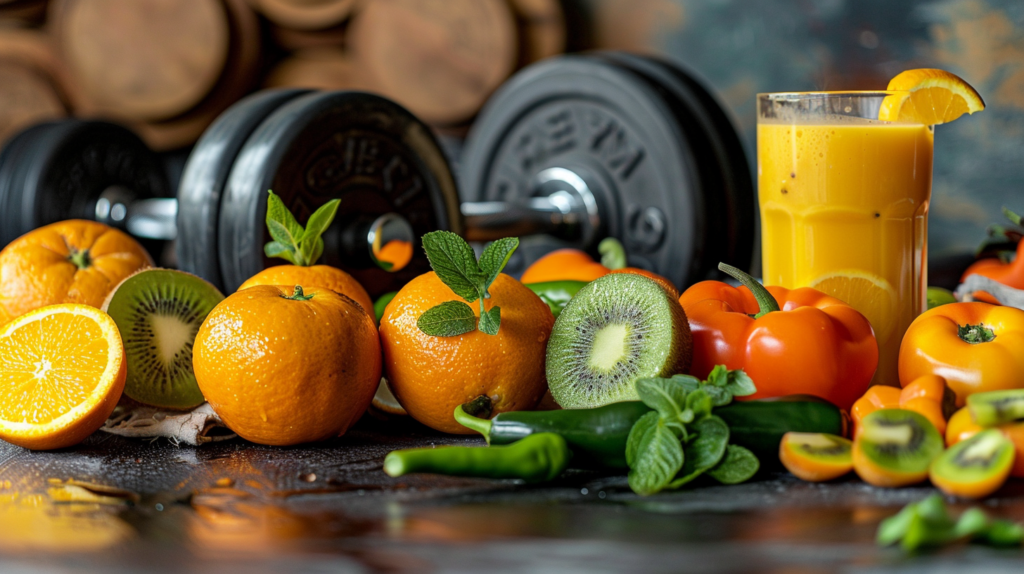
Vitamin C plays an essential role in our recovery process, helping to reduce muscle soreness and support overall healing after intense workouts. Studies have shown that this powerful antioxidant can help mitigate oxidative stress caused by strenuous exercise, allowing us to bounce back quicker. By incorporating adequate vitamin C into our nutrition plans, we can enhance our recovery efforts considerably.
To optimize our recovery, we should consider the best vitamin C sources. Citrus fruits like oranges and grapefruits, as well as strawberries, kiwi, and bell peppers, are excellent choices. Additionally, we can include supplements if we struggle to meet our daily needs through diet alone.
When it comes to vitamin C dosage, aiming for about 500 to 1000 mg daily can be beneficial for bodybuilders. This amount has been shown to support muscle repair and reduce soreness effectively. However, it’s vital to listen to our bodies and adjust based on personal needs and feedback.
B Vitamins for Energy
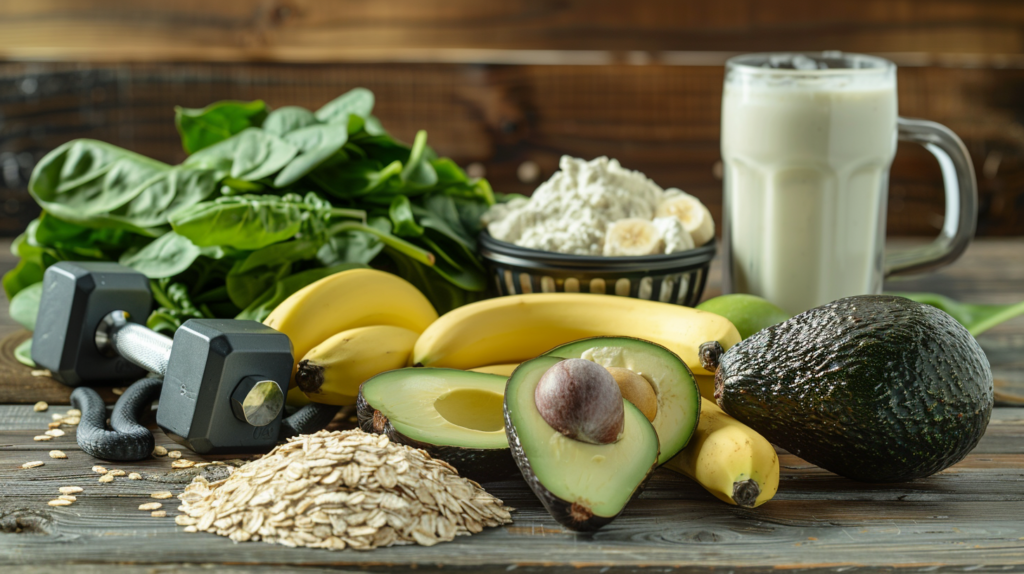
Fueling our workouts effectively hinges on the essential role B vitamins play in energy production and metabolism. These vitamins serve as coenzymes, facilitating various biochemical reactions that transform macronutrients into usable energy. Without adequate B vitamins, we may struggle with fatigue, hindering our performance and recovery.
To guarantee we’re getting the right amounts, let’s explore key B vitamin sources and their functions:
| B Vitamin | Functions | Food Sources |
| B1 (Thiamine) | Energy metabolism | Whole grains, nuts, pork |
| B2 (Riboflavin) | Energy production, antioxidant | Dairy, eggs, green leafy veggies |
| B3 (Niacin) | DNA repair, energy metabolism | Meat, fish, legumes |
| B6 (Pyridoxine) | Protein metabolism, cognitive function | Poultry, fish, potatoes |
| B12 (Cobalamin) | Red blood cell formation, nerve function | Meat, dairy, fortified cereals |
Vitamin E for Oxidative Stress

As bodybuilders, we must recognize that vitamin E plays an essential role in combating oxidative stress, which can undermine our recovery and overall performance. This powerful antioxidant helps neutralize free radicals produced during intense workouts, ultimately protecting our muscle cells and enhancing our ability to recover.
To boost our vitamin E intake, we can look to various sources. Nuts, seeds, and green leafy vegetables are rich in this nutrient, along with vegetable oils like sunflower and olive oil. Incorporating these foods into our meals guarantees we’re getting adequate amounts of vitamin E, which is vital for ideal health.
However, we should also consider how vitamin E absorption works. Consuming this vitamin alongside healthy fats can greatly enhance its absorption in our bodies. So, pairing a handful of nuts with a salad dressed in olive oil not only tastes great but also maximizes our nutrient intake.
Vitamin A for Immune Support

A strong immune system is vital for us bodybuilders, and vitamin A plays a key role in maintaining that defense against illness and infection. This powerful vitamin helps regulate our immune system, ensuring it functions effectively. It supports cellular communication and promotes the health of our mucosal barriers, which act as our first line of defense.
Moreover, vitamin A contributes to retinal health, which is important for our overall performance and focus during workouts. A deficiency can lead to compromised vision and hinder our training.
Here’s a quick overview of the benefits of vitamin A:
| Benefit | Description |
| Immune Support | Enhances the function of immune cells |
| Retinal Health | Supports vision and reduces the risk of night blindness |
| Cellular Growth | Promotes regeneration of epithelial tissues |
Incorporating vitamin A into our nutrition plans through food sources like carrots, sweet potatoes, and spinach is vital. By doing so, we can enhance our body’s resilience against infections and maintain peak performance. Let’s prioritize vitamin A for a healthier, more effective training regimen!
Frequently Asked Questions
How Do I Know if I Need Vitamin Supplements?
To know if we need vitamin supplements, we can conduct a dietary assessment and identify any symptoms of deficiency. By evaluating our nutrition, we empower ourselves to make informed choices about our health and well-being.
Are There Side Effects of Taking Too Many Vitamins?
Taking too many vitamins can feel like overloading a car with passengers; it can lead to vitamin toxicity and other issues. We should always balance our intake to avoid the dangers of excessive intake and maintain ideal health.
Can I Get Enough Vitamins From Food Alone?
Can we get enough vitamins from food alone? Absolutely! By choosing vitamin-rich foods and diverse dietary sources, we can meet our nutritional needs effectively, promoting overall health and energy without relying solely on supplements.
Should I Take Vitamins Before or After Workouts?
We’ve all wondered if pre workout vitamins could propel us into superhero status or if post workout recovery supplements really reveal our potential. Evidence suggests timing matters, so let’s explore both approaches for best results.
What Is the Best Time of Day to Take Vitamins?
We’ve found that taking vitamins in the morning routine enhances absorption rates. Starting our day with nutrients boosts energy and sets a positive tone, ensuring we’re ready to tackle our daily challenges effectively.
Conclusion
In our quest for muscle gains, it’s ironic how we often overlook the simple power of vitamins.
We might think that lifting heavier weights or consuming more protein is all it takes, but without essential nutrients like vitamins D, C, B, E, and A, we’re just building a house without a solid foundation.
By prioritizing these vitamins in our nutrition plans, we not only support our bodies but also release their true potential for growth and recovery.


